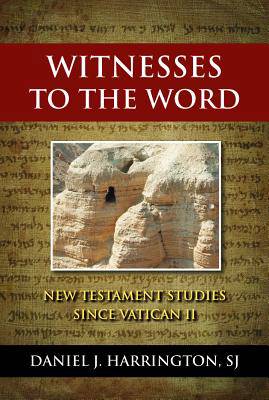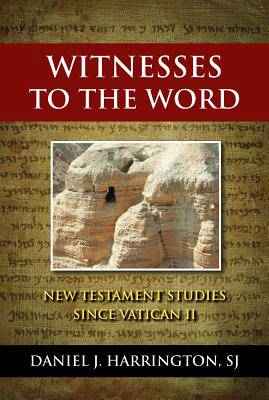
- Retrait gratuit dans votre magasin Club
- 7.000.000 titres dans notre catalogue
- Payer en toute sécurité
- Toujours un magasin près de chez vous
- Retrait gratuit dans votre magasin Club
- 7.000.0000 titres dans notre catalogue
- Payer en toute sécurité
- Toujours un magasin près de chez vous
Witnesses to the Word
New Testament Studies Since Vatican II
Daniel J Harrington
Livre broché | Anglais
16,95 €
+ 33 points
Description
Witnesses to the Word is based on the description of the Gospel writers in Dei verbum 19, which in turn alludes to Luke's description of his sources in the prologue to his Gospel (Luke 1:1-4). In the New Testament "the word"' can refer to the person of Jesus ("In the beginning was the Word," John 1:1) and to the good news about Jesus proclaimed by the early Christians and now preserved in the New Testament. Moreover, the modern scholars whose works are reported in this book have been in their own ways witnesses to the word of Scripture in that they have devoted their lives to the serious study of the New Testament. The subtitle, New Testament Studies since Vatican II, indicates that the author is seeking to describe what can be learned from the academic or scholarly reading of the Bible, and to suggest some open questions that might be addressed in the future. Harrington's goal is to show that scholarly study of the New Testament is both necessary and fruitful, and that a simplistic reading of Scripture does not do justice to its richness and will only impoverish the text and the reader. This book is truly a roadmap to New Testament study over the past fifty years. Throughout the author maintains a positive and constructive tone, long having been convinced that there need not exist an "ugly ditch" between the academic study of the Bible and the believer. Rather, in keeping with the Catholic Church in its recent official statements about the Bible and its interpretation, he believes that serious study of the Bible should both inform and enrich the life of the believer. In each of six chapters, the author describes some real scholarly progress since Vatican II, and about which ordinary people interested in religion and theology ought to know. He then offers ten thesis statements that explain what these developments are and why they are important, finishing with a general annotated bibliography. +
Spécifications
Parties prenantes
- Auteur(s) :
- Editeur:
Contenu
- Nombre de pages :
- 144
- Langue:
- Anglais
Caractéristiques
- EAN:
- 9780809148202
- Date de parution :
- 19-11-12
- Format:
- Livre broché
- Format numérique:
- Trade paperback (VS)
- Dimensions :
- 135 mm x 201 mm
- Poids :
- 181 g

Les avis
Nous publions uniquement les avis qui respectent les conditions requises. Consultez nos conditions pour les avis.






